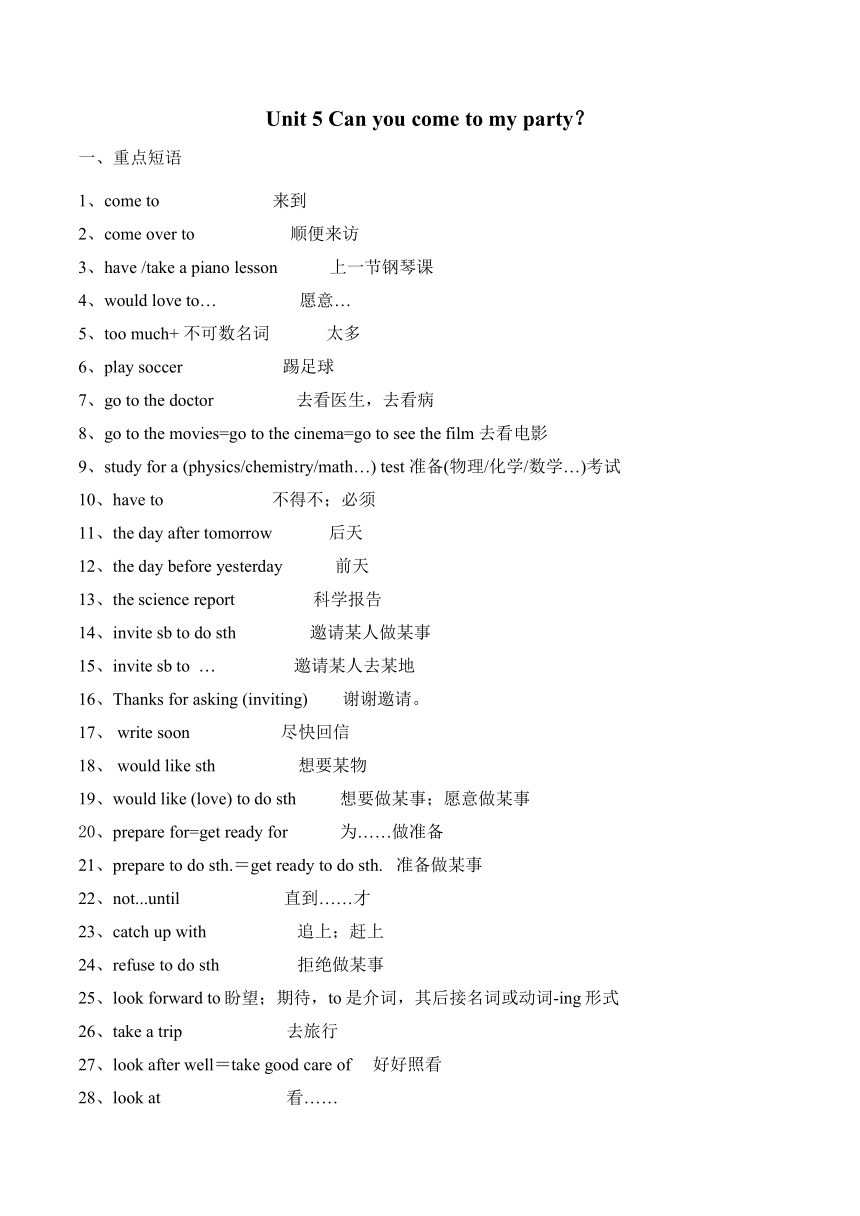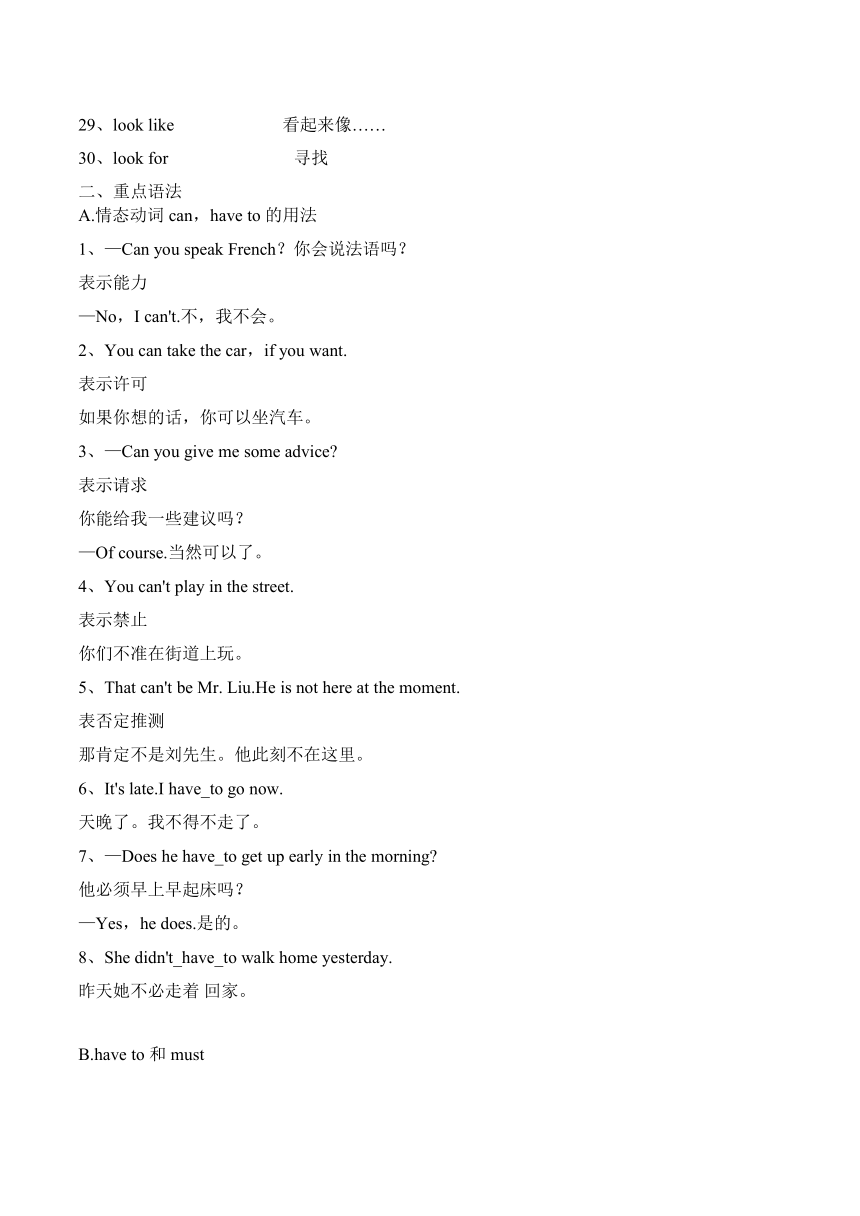Unit 5 Can you come to my party 知识巩固 鲁教版(五四学制)七年级英语下册(含答案)
文档属性
| 名称 | Unit 5 Can you come to my party 知识巩固 鲁教版(五四学制)七年级英语下册(含答案) |  | |
| 格式 | docx | ||
| 文件大小 | 21.4KB | ||
| 资源类型 | 教案 | ||
| 版本资源 | 鲁教版 | ||
| 科目 | 英语 | ||
| 更新时间 | 2024-03-11 15:29:26 | ||
图片预览


文档简介
Unit 5 Can you come to my party?
一、重点短语
1、come to 来到
2、come over to 顺便来访
3、have /take a piano lesson 上一节钢琴课
4、would love to… 愿意…
5、too much+ 不可数名词 太多
6、play soccer 踢足球
7、go to the doctor 去看医生,去看病
8、go to the movies=go to the cinema=go to see the film 去看电影
9、study for a (physics/chemistry/math…) test 准备(物理/化学/数学…)考试
10、have to 不得不;必须
11、the day after tomorrow 后天
12、the day before yesterday 前天
13、the science report 科学报告
14、invite sb to do sth 邀请某人做某事
15、invite sb to … 邀请某人去某地
16、Thanks for asking (inviting) 谢谢邀请。
17、 write soon 尽快回信
18、 would like sth 想要某物
19、would like (love) to do sth 想要做某事;愿意做某事
20、prepare for=get ready for 为……做准备
21、prepare to do sth.=get ready to do sth. 准备做某事
22、not...until 直到……才
23、catch up with 追上;赶上
24、refuse to do sth 拒绝做某事
25、look forward to盼望;期待,to是介词,其后接名词或动词 ing形式
26、take a trip 去旅行
27、look after well=take good care of 好好照看
28、look at 看……
29、look like 看起来像……
30、look for 寻找
二、重点语法
A.情态动词can,have to 的用法
1、—Can you speak French?你会说法语吗?
表示能力
—No,I can't.不,我不会。
2、You can take the car,if you want.
表示许可
如果你想的话,你可以坐汽车。
3、—Can you give me some advice
表示请求
你能给我一些建议吗?
—Of course.当然可以了。
4、You can't play in the street.
表示禁止
你们不准在街道上玩。
5、That can't be Mr. Liu.He is not here at the moment.
表否定推测
那肯定不是刘先生。他此刻不在这里。
6、It's late.I have_to go now.
天晚了。我不得不走了。
7、—Does he have_to get up early in the morning
他必须早上早起床吗?
—Yes,he does.是的。
8、She didn't_have_to walk home yesterday.
昨天她不必走着 回家。
B.have to 和must
have to强调因客观原因而“不得不”。它有时态、人称和数的变化。其第三人称单数为 has to,过去式为 had to。由 have to构成的句子,进行句型转换时要借助 do,does 和did。
It's raining.I have to stay at home. 天在下雨。我不得不待在家里。
must 强调主观上“ 必须”,没有人称和数的变化。其句型变换无需借助助动词。
You must do your homework first. 你必须先做作业。
have to 不得不,必须。表示客观情况要求某人必须做某事,有人称和时态的变化,后接动词原形,其否定形式为don't have to。
She isn't very well these days and she has to stay at home.
她这些天身体不太好,不得不待在家里。
You don't have to tell me this.你不必告诉我这件事。
C. reply和answer
这两个词有相同的含义,即“回答;应答”,都可以作及物动词和不及物动词用,但answer较常用。
reply较正式,除了后面接直接引语或that引导的从句外,一般只用作不及物动词,后面与to连用,表示“回答某人的问题、话语、信件、祝贺等”。
Who can answer the question 谁能回答这个问题?
I'll reply to your letter tomorrow. 明天我将给你回信。
D. look forward to 和 expect
look forward to期待,指带着愉快的心情期待着某事的发生。
The students are looking forward to their holiday.
学生们盼望着假期的来临。
expect期待,指确信某事必将发生,多用于好的事物,也可用于不好的事物。
I didn't expect to meet you here.
我没有预料到会在这儿遇到你。
三、填空题
1.You cant get off the bus until it __________(stop).
2.She__________(not leave) until her mother comes back
3.We are planning__________(hang) out with our friends this Sunday.
4.The Whites often invite me__________(have) dinner with them on weekends.
5.Nobody likes to make friends with him because he often refuses__________(help) others.
四、翻译句子
6.昨天他接受了我的礼物。
He_______my_________yesterday.
7.他们前天上了一节钢琴课。
They had a piano lesson _____________.
8.他直到下个星期五才会离开广州。
He_______leaving Guangzhou _________ next Friday
9.本周六我计划练习小提琴。
I’m_________to practice the _______ this Saturday.
10.你还记得去年秋天我们一起骑自行车旅行的事吗
Do you remember that we _______together_________
答案
1.答案:stops/has stopped
2.答案:won’t leave
3.答案:to hang
4.答案:to have
5.答案:to help
6.答案:accepted;gift
7.答案:the day before yesterday
8.答案:isn’t;until
9.答案:planning;violin
10.答案:went bike riding ;last fall
一、重点短语
1、come to 来到
2、come over to 顺便来访
3、have /take a piano lesson 上一节钢琴课
4、would love to… 愿意…
5、too much+ 不可数名词 太多
6、play soccer 踢足球
7、go to the doctor 去看医生,去看病
8、go to the movies=go to the cinema=go to see the film 去看电影
9、study for a (physics/chemistry/math…) test 准备(物理/化学/数学…)考试
10、have to 不得不;必须
11、the day after tomorrow 后天
12、the day before yesterday 前天
13、the science report 科学报告
14、invite sb to do sth 邀请某人做某事
15、invite sb to … 邀请某人去某地
16、Thanks for asking (inviting) 谢谢邀请。
17、 write soon 尽快回信
18、 would like sth 想要某物
19、would like (love) to do sth 想要做某事;愿意做某事
20、prepare for=get ready for 为……做准备
21、prepare to do sth.=get ready to do sth. 准备做某事
22、not...until 直到……才
23、catch up with 追上;赶上
24、refuse to do sth 拒绝做某事
25、look forward to盼望;期待,to是介词,其后接名词或动词 ing形式
26、take a trip 去旅行
27、look after well=take good care of 好好照看
28、look at 看……
29、look like 看起来像……
30、look for 寻找
二、重点语法
A.情态动词can,have to 的用法
1、—Can you speak French?你会说法语吗?
表示能力
—No,I can't.不,我不会。
2、You can take the car,if you want.
表示许可
如果你想的话,你可以坐汽车。
3、—Can you give me some advice
表示请求
你能给我一些建议吗?
—Of course.当然可以了。
4、You can't play in the street.
表示禁止
你们不准在街道上玩。
5、That can't be Mr. Liu.He is not here at the moment.
表否定推测
那肯定不是刘先生。他此刻不在这里。
6、It's late.I have_to go now.
天晚了。我不得不走了。
7、—Does he have_to get up early in the morning
他必须早上早起床吗?
—Yes,he does.是的。
8、She didn't_have_to walk home yesterday.
昨天她不必走着 回家。
B.have to 和must
have to强调因客观原因而“不得不”。它有时态、人称和数的变化。其第三人称单数为 has to,过去式为 had to。由 have to构成的句子,进行句型转换时要借助 do,does 和did。
It's raining.I have to stay at home. 天在下雨。我不得不待在家里。
must 强调主观上“ 必须”,没有人称和数的变化。其句型变换无需借助助动词。
You must do your homework first. 你必须先做作业。
have to 不得不,必须。表示客观情况要求某人必须做某事,有人称和时态的变化,后接动词原形,其否定形式为don't have to。
She isn't very well these days and she has to stay at home.
她这些天身体不太好,不得不待在家里。
You don't have to tell me this.你不必告诉我这件事。
C. reply和answer
这两个词有相同的含义,即“回答;应答”,都可以作及物动词和不及物动词用,但answer较常用。
reply较正式,除了后面接直接引语或that引导的从句外,一般只用作不及物动词,后面与to连用,表示“回答某人的问题、话语、信件、祝贺等”。
Who can answer the question 谁能回答这个问题?
I'll reply to your letter tomorrow. 明天我将给你回信。
D. look forward to 和 expect
look forward to期待,指带着愉快的心情期待着某事的发生。
The students are looking forward to their holiday.
学生们盼望着假期的来临。
expect期待,指确信某事必将发生,多用于好的事物,也可用于不好的事物。
I didn't expect to meet you here.
我没有预料到会在这儿遇到你。
三、填空题
1.You cant get off the bus until it __________(stop).
2.She__________(not leave) until her mother comes back
3.We are planning__________(hang) out with our friends this Sunday.
4.The Whites often invite me__________(have) dinner with them on weekends.
5.Nobody likes to make friends with him because he often refuses__________(help) others.
四、翻译句子
6.昨天他接受了我的礼物。
He_______my_________yesterday.
7.他们前天上了一节钢琴课。
They had a piano lesson _____________.
8.他直到下个星期五才会离开广州。
He_______leaving Guangzhou _________ next Friday
9.本周六我计划练习小提琴。
I’m_________to practice the _______ this Saturday.
10.你还记得去年秋天我们一起骑自行车旅行的事吗
Do you remember that we _______together_________
答案
1.答案:stops/has stopped
2.答案:won’t leave
3.答案:to hang
4.答案:to have
5.答案:to help
6.答案:accepted;gift
7.答案:the day before yesterday
8.答案:isn’t;until
9.答案:planning;violin
10.答案:went bike riding ;last fall
同课章节目录
- Unit 1 Do you want to watch a game show?
- Section A
- Section B
- Unit 2 I'm going to study computer science.
- Section A
- Section B
- Unit 3 Will people have robots?
- Section A
- Section B
- Unit 4 How do you make a banana milk shake?
- Section A
- Section B
- Unit 5 Can you come to my party?
- Section A
- Section B
- Unit 6 If you go to the party, you'll have a great
- Section A
- Section B
- Unit 7 What's the matter?
- Section A
- Section B
- Unit 8 I'll help to clean up the city parks.
- Section A
- Section B
